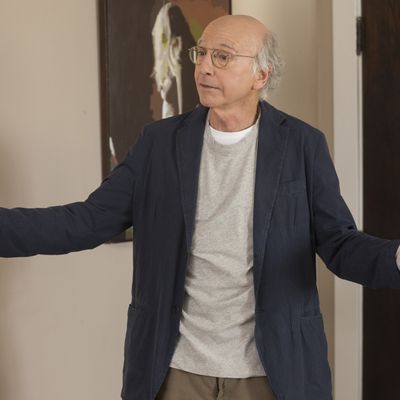
Spoilers ahead for the season-nine premiere of Curb Your Enthusiasm.
You might think misanthropy would never go out of style — in comedy, anyway — but here comes Curb Your Enthusiasm to test that theory.
Larry David’s HBO series is one of the great half-hour shows in the history of the medium, amplifying the old Seinfeld formula of toxic narcissism plus shenanigans and pushing the result so far that viewers get whiplash from laughing and cringing. Most of the great Curb episodes set its protagonist, Larry David (played by creator-star Larry David), against various perceived enemies, in the process depicting him as both crusader and clown, both martyr and menace. Most of the time, Larry seizes on some small inconvenience or alleged sign of disrespect, or fancies himself an expert in a field he knows nothing about, or otherwise makes an ass of himself, and keeps doubling down on his asininity until you look forward to the moment where he’s hoist on his own petard, the show’s familiar tuba-driven theme burbling merrily as the director slow-zooms into a closeup of his dumbstruck face. Of course, there are times when Larry’s outrage seems rooted in something genuine, and it’s his expression of that outrage that’s the problem; sometimes he encounters people who are just as unreasonably combative as himself, even more so, and you find yourself cheering for Larry not because he’s right, but because he’s the lesser of two assholes. The seesaw of empathy and disapproval is what makes Curb thrilling to watch. The show is at its best when it’s puncturing particular brands of hypocrisy (often those expressed by rich, white entertainment-industry liberals) or punching up at people who seem to have no idea how pampered and oblivious they are to actual, real problems. The last couple of seasons struggled to adapt to dramatic changes in both society and in its main character’s line of work (mass entertainment generally, and HBO in particular, have become somewhat less of a straight white guy’s playground since Curb debuted in 2000).
Sunday’s ninth-season debut felt like a throwback in a bad way — not just to the earliest season of Curb, but to the Puerto Rican Day episode of Seinfeld, which was so touristy in its absurdism and so cluelessly insensitive that NBC initially pulled it from the series’ syndication package. The problem isn’t just that Larry is still a rich know-it-all asshole — he’s always been that, and it’s the wellspring of his anti-charisma. It’s that the show feels as if it’s not actually doing the homework necessary to get Larry into the comic situations he needs to inhabit with gleeful, acidic verve.
Under what combination of circumstances would a short-haired, androgynous-looking lesbian (Julie Goldman’s Betty) not only expect a guy like Larry to open a door for her, but get cranky when he didn’t? There’s a key piece of information missing in this subplot — the question of whether Betty expected Larry to open the door for her because she’s a woman, or simply because opening a door for another person is the right and decent thing to do. (“No ‘After you?’” she asks him, confusing the issue in a way that lets Larry off the hook.) And I didn’t believe one frame of the scenes in which Larry convinces Betty and her fiancée, Numa (Nasim Pedrad), that they’re playing the wrong roles during their wedding ceremony. There’s nothing wrong with any of this stuff that a five-minute conversation with people who know the subject couldn’t have solved, and it’s depressing that Curb didn’t make that minimal effort. All the stuff with Larry trying to pawn off his lazy but also handicapped (and constipated) assistant (Carrie Brownstein) left a bitter aftertaste, too, because it’s another instance of David punching down, and because, like the stuff with the lesbian wedding, it feels more like a notion for a Curb subplot than an actual subplot.
The fatwa story line — which apparently is going to be a season-long thing — is an even bigger disaster. On paper, I love the idea of Larry becoming an American Salman Rushdie by trying to tell his story in the form of a stage musical. It’s got a shamelessly metafictional kick. It seems like the logical extension of Larry’s countless arrogant crusades over the years, which are often rooted in the false notion that he’s the good guy in a given scenario when he’s really just an irritant. He thinks he’s entitled to everything, including other people’s stories of persecution. Based on what we know about Larry, there’s no question that a guy like him would perversely envy Rushdie, whose novel The Satanic Verses deliberately thumbed its nose at authorities daring to tell an artist what he could and could not depict. But the fatwa that’s declared against Larry is too predictable and half-assed. The scene where Larry imitates hearing his own name spoken in Persian, strewn amid proclamations of rage, is reheated Andrew Dice Clay material from the early ’90s.
It’s hard to believe that this is the same comic artist whose last season of Curb gave us “Palestinian Chicken,” which likewise skipped through a cultural and political minefield, but earned every uneasy laugh by rooting its comedy in people setting their professed values aside in the name of hunger or lust, something everyone can understand and appreciate if they’re being honest.
The only other episode of Curb’s ninth season that I’ve seen is episode five, which I can’t tell you about because it’s embargoed by HBO. It’s not great, either, but it’s much better and funnier than this debut. And it’s a stand-alone episode that has nothing to do with the fatwa story line, which needs to be articulated with a lot more intelligence than it was in this premiere if it’s going to justify its own existence.


